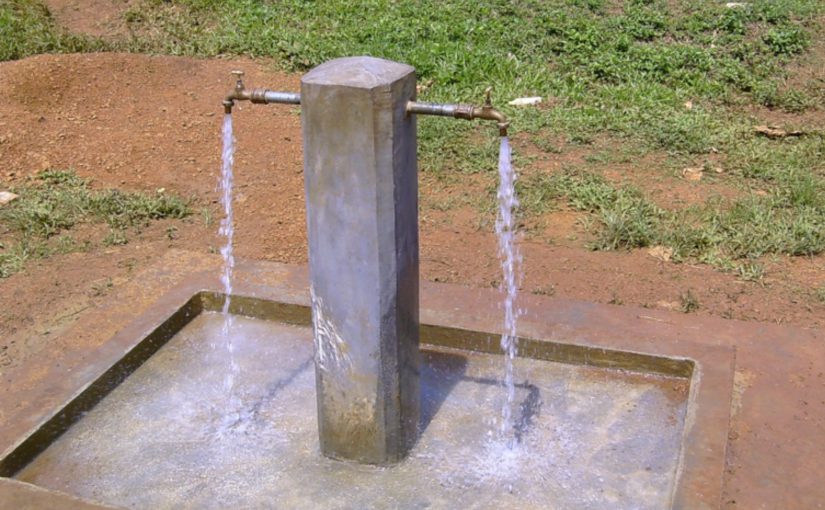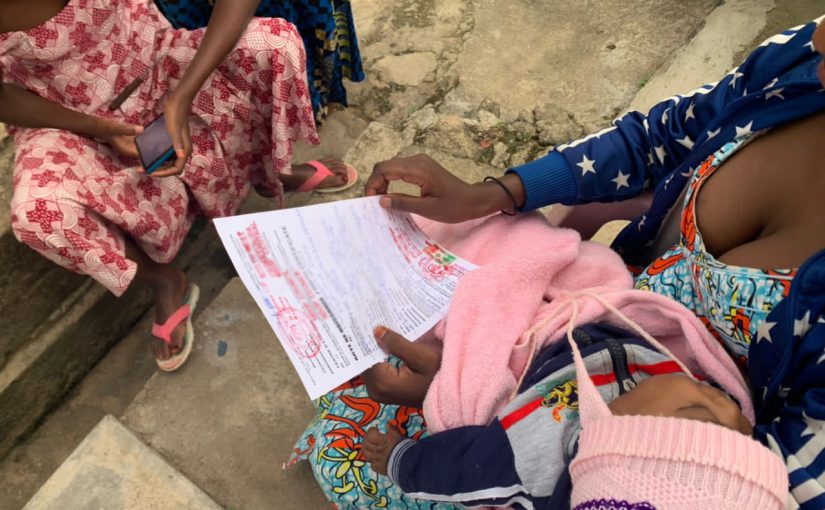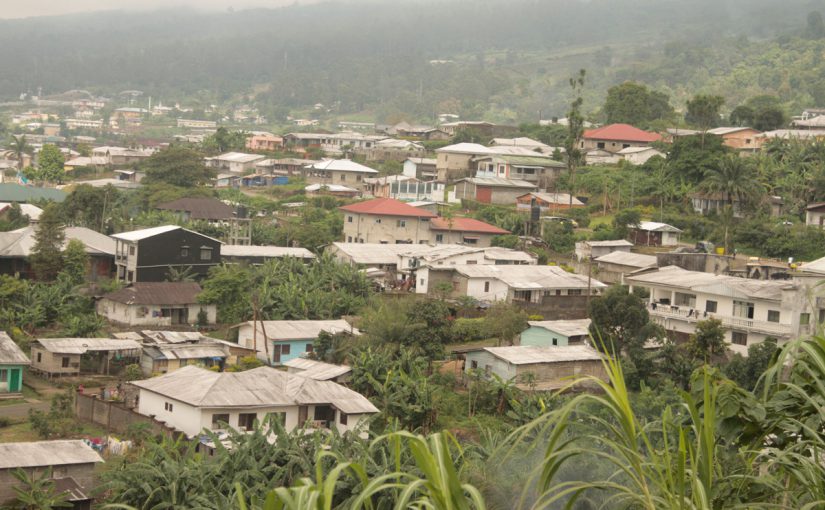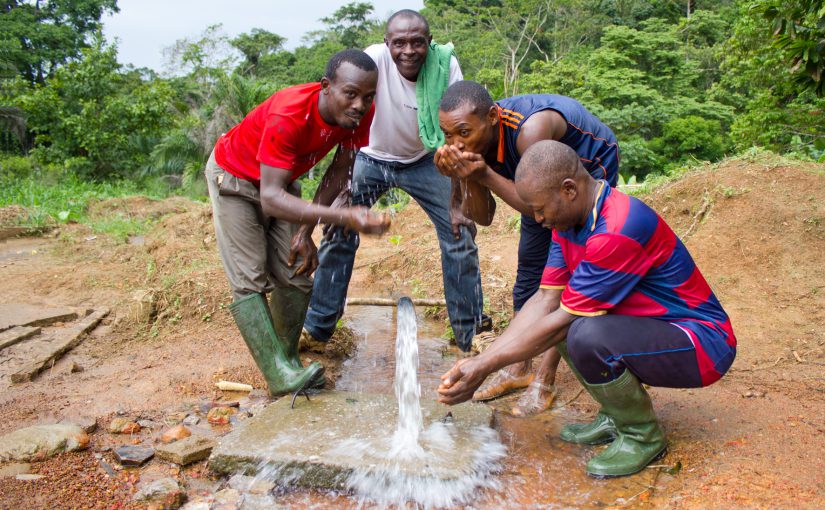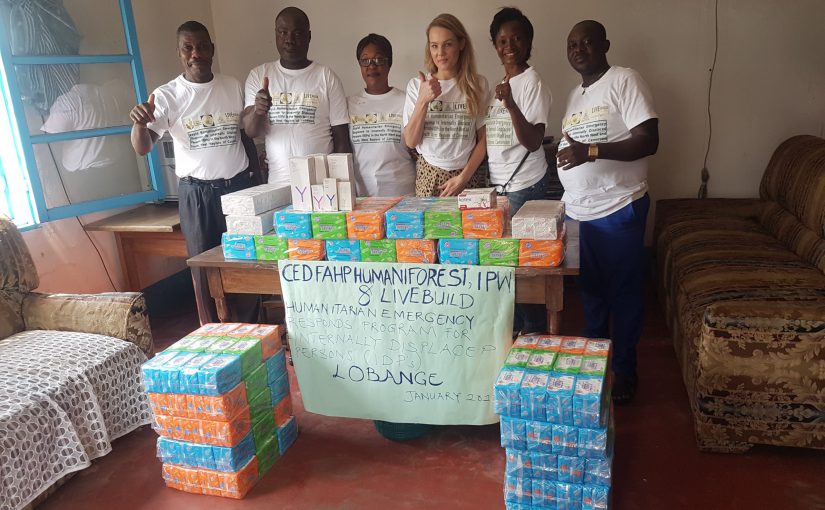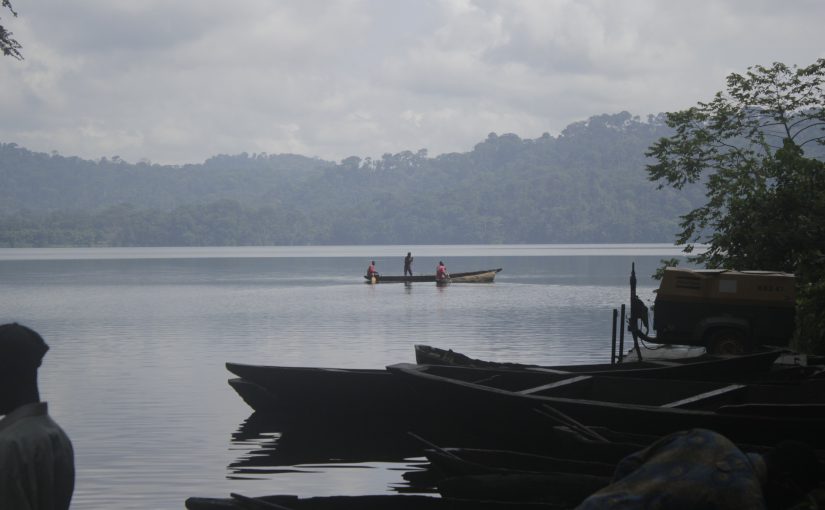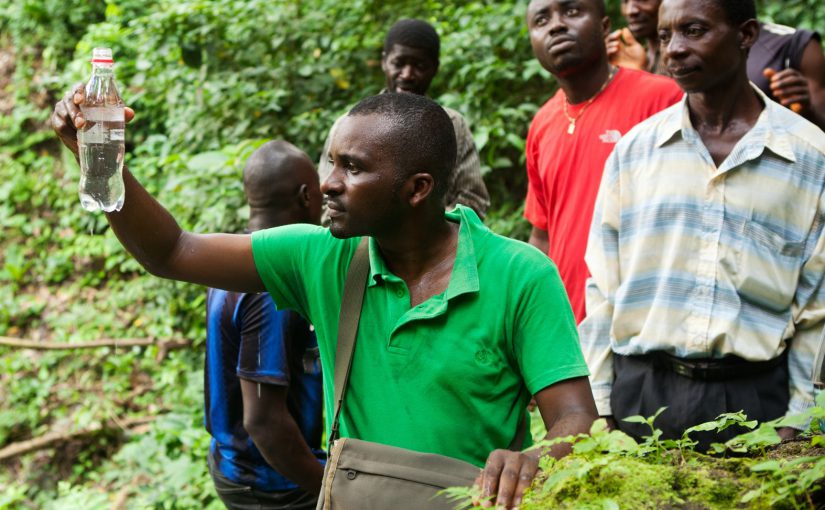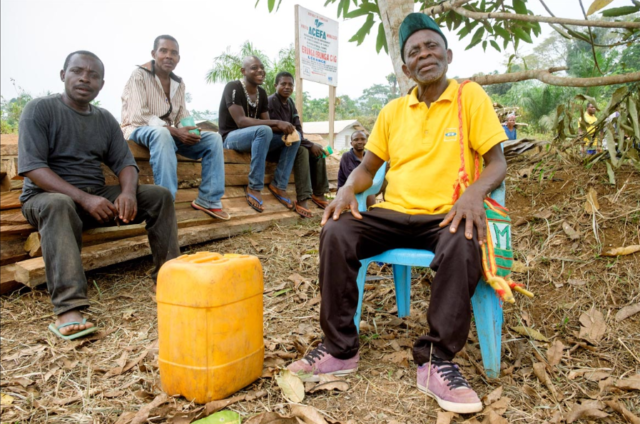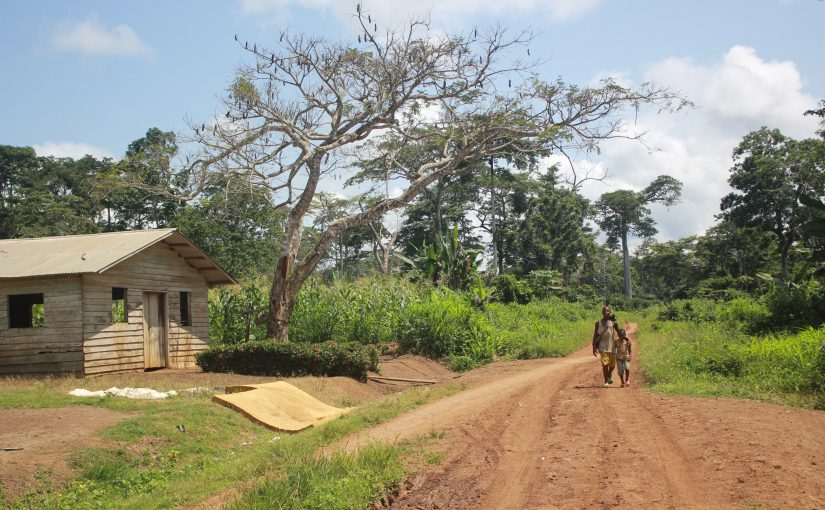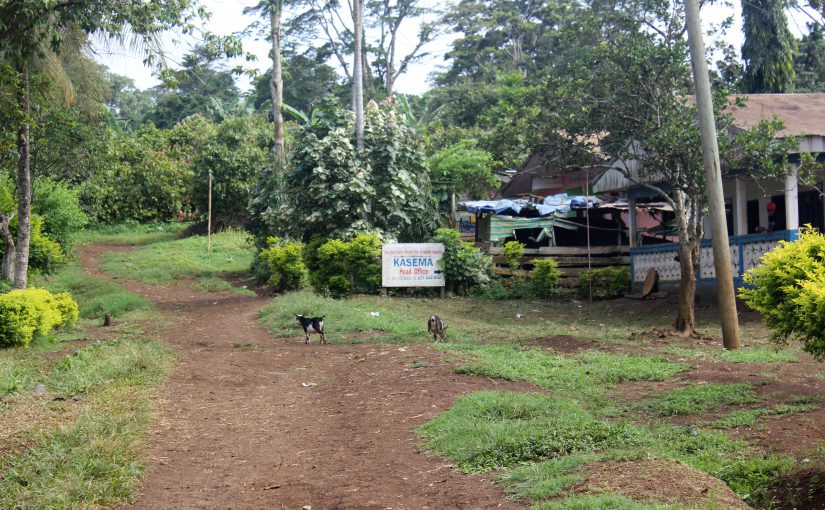Seven communities concentrated around Buea Town in Southwest Region of Cameroon do not have proper access to potable water. To this day the 15,500 inhabitants of these communities queue for the little drinking water taps available or depend on buying water in jerry cans.
Seven communities concentrated around Buea Town in Southwest Region of Cameroon do not have proper access to potable water. This is rather surprising as these communities are situated on the slope of Mount Cameroon, a 4,000 metres high volcano, with ample springs and a high availability of water. To this day the 15,000 inhabitants of these communities queue for the little drinking water taps available or depend on buying water in jerry cans. Obviously this influences the hygienic conditions and economic position of the communities heavily.
LiveBuild and Humaniforest support the communities to manage their own water system and to conserve their water sources. The communities implement a ‘community-owned, business operated’ model to enable them to generate sufficient income to maintain the system. This system will be a gravitional system in order to avoid high running costs because of pumping water. The new water system will contain new construction and the renovation of parts of dysfunctional existing water systems.
Seven communities concentrated around Buea Town in Southwest Region of Cameroon do not have proper access to potable water. This is rather surprising as these communities are situated on the slope of Mount Cameroon, a 4,000 metres high volcano, with ample springs and a high availability of water. To this day the 15,000 inhabitants of these communities queue for the little drinking water taps available or depend on buying water in jerry cans. Obviously this influences the hygienic conditions and economic position of the communities heavily.
Seven communities concentrated around Buea Town in Southwest Region of Cameroon do not have proper access to potable water. This is rather surprising as these communities are situated on the slope of Mount Cameroon, a 4,000 metres high volcano, with ample springs and a high availability of water. To this day the 15,000 inhabitants of these communities queue for the little drinking water taps available or depend on buying water in jerry cans. Obviously this influences the hygienic conditions and economic position of the communities heavily.
LiveBuild and Humaniforest support the communities to manage their own water system and to conserve their water sources. The communities implement a ‘community-owned, business operated’ model to enable them to generate sufficient income to maintain the system. This system will be a gravitional system in order to avoid high running costs because of pumping water. The new water system will contain new construction and the renovation of parts of dysfunctional existing water systems.
Seven communities concentrated around Buea Town in Southwest Region of Cameroon do not have proper access to potable water. This is rather surprising as these communities are situated on the slope of Mount Cameroon, a 4,000 metres high volcano, with ample springs and a high availability of water. To this day the 15,000 inhabitants of these communities queue for the little drinking water taps available or depend on buying water in jerry cans. Obviously this influences the hygienic conditions and economic position of the communities heavily.
Seven communities concentrated around Buea Town in Southwest Region of Cameroon do not have proper access to potable water. This is rather surprising as these communities are situated on the slope of Mount Cameroon, a 4,000 metres high volcano, with ample springs and a high availability of water. To this day the 15,000 inhabitants of these communities queue for the little drinking water taps available or depend on buying water in jerry cans. Obviously this influences the hygienic conditions and economic position of the communities heavily.
LiveBuild and Humaniforest support the communities to manage their own water system and to conserve their water sources. The communities implement a ‘community-owned, business operated’ model to enable them to generate sufficient income to maintain the system. This system will be a gravitional system in order to avoid high running costs because of pumping water. The new water system will contain new construction and the renovation of parts of dysfunctional existing water systems.
Seven communities concentrated around Buea Town in Southwest Region of Cameroon do not have proper access to potable water. This is rather surprising as these communities are situated on the slope of Mount Cameroon, a 4,000 metres high volcano, with ample springs and a high availability of water. To this day the 15,000 inhabitants of these communities queue for the little drinking water taps available or depend on buying water in jerry cans. Obviously this influences the hygienic conditions and economic position of the communities heavily.
Seven communities concentrated around Buea Town in Southwest Region of Cameroon do not have proper access to potable water. This is rather surprising as these communities are situated on the slope of Mount Cameroon, a 4,000 metres high volcano, with ample springs and a high availability of water. To this day the 15,000 inhabitants of these communities queue for the little drinking water taps available or depend on buying water in jerry cans. Obviously this influences the hygienic conditions and economic position of the communities heavily.
LiveBuild and Humaniforest support the communities to manage their own water system and to conserve their water sources. The communities implement a ‘community-owned, business operated’ model to enable them to generate sufficient income to maintain the system. This system will be a gravitional system in order to avoid high running costs because of pumping water. The new water system will contain new construction and the renovation of parts of dysfunctional existing water systems.
Seven communities concentrated around Buea Town in Southwest Region of Cameroon do not have proper access to potable water. This is rather surprising as these communities are situated on the slope of Mount Cameroon, a 4,000 metres high volcano, with ample springs and a high availability of water. To this day the 15,500 inhabitants of these communities queue for the little drinking water taps available or depend on buying water in jerry cans. Obviously this influences the hygienic conditions and economic position of the communities heavily.
Seven communities concentrated around Buea Town in Southwest Region of Cameroon do not have proper access to potable water. This is rather surprising as these communities are situated on the slope of Mount Cameroon, a 4,000 metres high volcano, with ample springs and a high availability of water. To this day the 15,000 inhabitants of these communities queue for the little drinking water taps available or depend on buying water in jerry cans. Obviously this influences the hygienic conditions and economic position of the communities heavily.
LiveBuild and Humaniforest support the communities to manage their own water system and to conserve their water sources. The communities implement a ‘community-owned, business operated’ model to enable them to generate sufficient income to maintain the system. This system will be a gravitional system in order to avoid high running costs because of pumping water. The new water system will contain new construction and the renovation of parts of dysfunctional existing water systems.
Seven communities concentrated around Buea Town in Southwest Region of Cameroon do not have proper access to potable water. This is rather surprising as these communities are situated on the slope of Mount Cameroon, a 4,000 metres high volcano, with ample springs and a high availability of water. To this day the 15,000 inhabitants of these communities queue for the little drinking water taps available or depend on buying water in jerry cans. Obviously this influences the hygienic conditions and economic position of the communities heavily.
Seven communities concentrated around Buea Town in Southwest Region of Cameroon do not have proper access to potable water. This is rather surprising as these communities are situated on the slope of Mount Cameroon, a 4,000 metres high volcano, with ample springs and a high availability of water. To this day the 15,000 inhabitants of these communities queue for the little drinking water taps available or depend on buying water in jerry cans. Obviously this influences the hygienic conditions and economic position of the communities heavily.
LiveBuild and Humaniforest support the communities to manage their own water system and to conserve their water sources. The communities implement a ‘community-owned, business operated’ model to enable them to generate sufficient income to maintain the system. This system will be a gravitional system in order to avoid high running costs because of pumping water. The new water system will contain new construction and the renovation of parts of dysfunctional existing water systems.
Seven communities concentrated around Buea Town in Southwest Region of Cameroon do not have proper access to potable water. This is rather surprising as these communities are situated on the slope of Mount Cameroon, a 4,000 metres high volcano, with ample springs and a high availability of water. To this day the 15,000 inhabitants of these communities queue for the little drinking water taps available or depend on buying water in jerry cans. Obviously this influences the hygienic conditions and economic position of the communities heavily.
Seven communities concentrated around Buea Town in Southwest Region of Cameroon do not have proper access to potable water. This is rather surprising as these communities are situated on the slope of Mount Cameroon, a 4,000 metres high volcano, with ample springs and a high availability of water. To this day the 15,000 inhabitants of these communities queue for the little drinking water taps available or depend on buying water in jerry cans. Obviously this influences the hygienic conditions and economic position of the communities heavily.
LiveBuild and Humaniforest support the communities to manage their own water system and to conserve their water sources. The communities implement a ‘community-owned, business operated’ model to enable them to generate sufficient income to maintain the system. This system will be a gravitional system in order to avoid high running costs because of pumping water. The new water system will contain new construction and the renovation of parts of dysfunctional existing water systems.
Seven communities concentrated around Buea Town in Southwest Region of Cameroon do not have proper access to potable water. This is rather surprising as these communities are situated on the slope of Mount Cameroon, a 4,000 metres high volcano, with ample springs and a high availability of water. To this day the 15,000 inhabitants of these communities queue for the little drinking water taps available or depend on buying water in jerry cans. Obviously this influences the hygienic conditions and economic position of the communities heavily.
Seven communities concentrated around Buea Town in Southwest Region of Cameroon do not have proper access to potable water. This is rather surprising as these communities are situated on the slope of Mount Cameroon, a 4,000 metres high volcano, with ample springs and a high availability of water. To this day the 15,000 inhabitants of these communities queue for the little drinking water taps available or depend on buying water in jerry cans. Obviously this influences the hygienic conditions and economic position of the communities heavily.
LiveBuild and Humaniforest support the communities to manage their own water system and to conserve their water sources. The communities implement a ‘community-owned, business operated’ model to enable them to generate sufficient income to maintain the system. This system will be a gravitional system in order to avoid high running costs because of pumping water. The new water system will contain new construction and the renovation of parts of dysfunctional existing water systems.
Seven communities concentrated around Buea Town in Southwest Region of Cameroon do not have proper access to potable water. To this day the 15,500 inhabitants of these communities queue for the little drinking water taps available or depend on buying water in jerry cans.
Seven communities concentrated around Buea Town in Southwest Region of Cameroon do not have proper access to potable water. This is rather surprising as these communities are situated on the slope of Mount Cameroon, a 4,000 metres high volcano, with ample springs and a high availability of water. To this day the 15,000 inhabitants of these communities queue for the little drinking water taps available or depend on buying water in jerry cans. Obviously this influences the hygienic conditions and economic position of the communities heavily.
LiveBuild and Humaniforest support the communities to manage their own water system and to conserve their water sources. The communities implement a ‘community-owned, business operated’ model to enable them to generate sufficient income to maintain the system. This system will be a gravitional system in order to avoid high running costs because of pumping water. The new water system will contain new construction and the renovation of parts of dysfunctional existing water systems.
Seven communities concentrated around Buea Town in Southwest Region of Cameroon do not have proper access to potable water. This is rather surprising as these communities are situated on the slope of Mount Cameroon, a 4,000 metres high volcano, with ample springs and a high availability of water. To this day the 15,000 inhabitants of these communities queue for the little drinking water taps available or depend on buying water in jerry cans. Obviously this influences the hygienic conditions and economic position of the communities heavily.
Seven communities concentrated around Buea Town in Southwest Region of Cameroon do not have proper access to potable water. This is rather surprising as these communities are situated on the slope of Mount Cameroon, a 4,000 metres high volcano, with ample springs and a high availability of water. To this day the 15,000 inhabitants of these communities queue for the little drinking water taps available or depend on buying water in jerry cans. Obviously this influences the hygienic conditions and economic position of the communities heavily.
LiveBuild and Humaniforest support the communities to manage their own water system and to conserve their water sources. The communities implement a ‘community-owned, business operated’ model to enable them to generate sufficient income to maintain the system. This system will be a gravitional system in order to avoid high running costs because of pumping water. The new water system will contain new construction and the renovation of parts of dysfunctional existing water systems.
Seven communities concentrated around Buea Town in Southwest Region of Cameroon do not have proper access to potable water. This is rather surprising as these communities are situated on the slope of Mount Cameroon, a 4,000 metres high volcano, with ample springs and a high availability of water. To this day the 15,000 inhabitants of these communities queue for the little drinking water taps available or depend on buying water in jerry cans. Obviously this influences the hygienic conditions and economic position of the communities heavily.
Seven communities concentrated around Buea Town in Southwest Region of Cameroon do not have proper access to potable water. This is rather surprising as these communities are situated on the slope of Mount Cameroon, a 4,000 metres high volcano, with ample springs and a high availability of water. To this day the 15,000 inhabitants of these communities queue for the little drinking water taps available or depend on buying water in jerry cans. Obviously this influences the hygienic conditions and economic position of the communities heavily.
LiveBuild and Humaniforest support the communities to manage their own water system and to conserve their water sources. The communities implement a ‘community-owned, business operated’ model to enable them to generate sufficient income to maintain the system. This system will be a gravitional system in order to avoid high running costs because of pumping water. The new water system will contain new construction and the renovation of parts of dysfunctional existing water systems.
Seven communities concentrated around Buea Town in Southwest Region of Cameroon do not have proper access to potable water. This is rather surprising as these communities are situated on the slope of Mount Cameroon, a 4,000 metres high volcano, with ample springs and a high availability of water. To this day the 15,000 inhabitants of these communities queue for the little drinking water taps available or depend on buying water in jerry cans. Obviously this influences the hygienic conditions and economic position of the communities heavily.
Seven communities concentrated around Buea Town in Southwest Region of Cameroon do not have proper access to potable water. This is rather surprising as these communities are situated on the slope of Mount Cameroon, a 4,000 metres high volcano, with ample springs and a high availability of water. To this day the 15,000 inhabitants of these communities queue for the little drinking water taps available or depend on buying water in jerry cans. Obviously this influences the hygienic conditions and economic position of the communities heavily.
LiveBuild and Humaniforest support the communities to manage their own water system and to conserve their water sources. The communities implement a ‘community-owned, business operated’ model to enable them to generate sufficient income to maintain the system. This system will be a gravitional system in order to avoid high running costs because of pumping water. The new water system will contain new construction and the renovation of parts of dysfunctional existing water systems.
Seven communities concentrated around Buea Town in Southwest Region of Cameroon do not have proper access to potable water. This is rather surprising as these communities are situated on the slope of Mount Cameroon, a 4,000 metres high volcano, with ample springs and a high availability of water. To this day the 15,500 inhabitants of these communities queue for the little drinking water taps available or depend on buying water in jerry cans. Obviously this influences the hygienic conditions and economic position of the communities heavily.
Seven communities concentrated around Buea Town in Southwest Region of Cameroon do not have proper access to potable water. This is rather surprising as these communities are situated on the slope of Mount Cameroon, a 4,000 metres high volcano, with ample springs and a high availability of water. To this day the 15,000 inhabitants of these communities queue for the little drinking water taps available or depend on buying water in jerry cans. Obviously this influences the hygienic conditions and economic position of the communities heavily.
LiveBuild and Humaniforest support the communities to manage their own water system and to conserve their water sources. The communities implement a ‘community-owned, business operated’ model to enable them to generate sufficient income to maintain the system. This system will be a gravitional system in order to avoid high running costs because of pumping water. The new water system will contain new construction and the renovation of parts of dysfunctional existing water systems.
Seven communities concentrated around Buea Town in Southwest Region of Cameroon do not have proper access to potable water. This is rather surprising as these communities are situated on the slope of Mount Cameroon, a 4,000 metres high volcano, with ample springs and a high availability of water. To this day the 15,000 inhabitants of these communities queue for the little drinking water taps available or depend on buying water in jerry cans. Obviously this influences the hygienic conditions and economic position of the communities heavily.
Seven communities concentrated around Buea Town in Southwest Region of Cameroon do not have proper access to potable water. This is rather surprising as these communities are situated on the slope of Mount Cameroon, a 4,000 metres high volcano, with ample springs and a high availability of water. To this day the 15,000 inhabitants of these communities queue for the little drinking water taps available or depend on buying water in jerry cans. Obviously this influences the hygienic conditions and economic position of the communities heavily.
LiveBuild and Humaniforest support the communities to manage their own water system and to conserve their water sources. The communities implement a ‘community-owned, business operated’ model to enable them to generate sufficient income to maintain the system. This system will be a gravitional system in order to avoid high running costs because of pumping water. The new water system will contain new construction and the renovation of parts of dysfunctional existing water systems.
Seven communities concentrated around Buea Town in Southwest Region of Cameroon do not have proper access to potable water. This is rather surprising as these communities are situated on the slope of Mount Cameroon, a 4,000 metres high volcano, with ample springs and a high availability of water. To this day the 15,000 inhabitants of these communities queue for the little drinking water taps available or depend on buying water in jerry cans. Obviously this influences the hygienic conditions and economic position of the communities heavily.
Seven communities concentrated around Buea Town in Southwest Region of Cameroon do not have proper access to potable water. This is rather surprising as these communities are situated on the slope of Mount Cameroon, a 4,000 metres high volcano, with ample springs and a high availability of water. To this day the 15,000 inhabitants of these communities queue for the little drinking water taps available or depend on buying water in jerry cans. Obviously this influences the hygienic conditions and economic position of the communities heavily.
LiveBuild and Humaniforest support the communities to manage their own water system and to conserve their water sources. The communities implement a ‘community-owned, business operated’ model to enable them to generate sufficient income to maintain the system. This system will be a gravitional system in order to avoid high running costs because of pumping water. The new water system will contain new construction and the renovation of parts of dysfunctional existing water systems.
Seven communities concentrated around Buea Town in Southwest Region of Cameroon do not have proper access to potable water. This is rather surprising as these communities are situated on the slope of Mount Cameroon, a 4,000 metres high volcano, with ample springs and a high availability of water. To this day the 15,000 inhabitants of these communities queue for the little drinking water taps available or depend on buying water in jerry cans. Obviously this influences the hygienic conditions and economic position of the communities heavily.
Seven communities concentrated around Buea Town in Southwest Region of Cameroon do not have proper access to potable water. This is rather surprising as these communities are situated on the slope of Mount Cameroon, a 4,000 metres high volcano, with ample springs and a high availability of water. To this day the 15,000 inhabitants of these communities queue for the little drinking water taps available or depend on buying water in jerry cans. Obviously this influences the hygienic conditions and economic position of the communities heavily.
LiveBuild and Humaniforest support the communities to manage their own water system and to conserve their water sources. The communities implement a ‘community-owned, business operated’ model to enable them to generate sufficient income to maintain the system. This system will be a gravitional system in order to avoid high running costs because of pumping water. The new water system will contain new construction and the renovation of parts of dysfunctional existing water systems.
